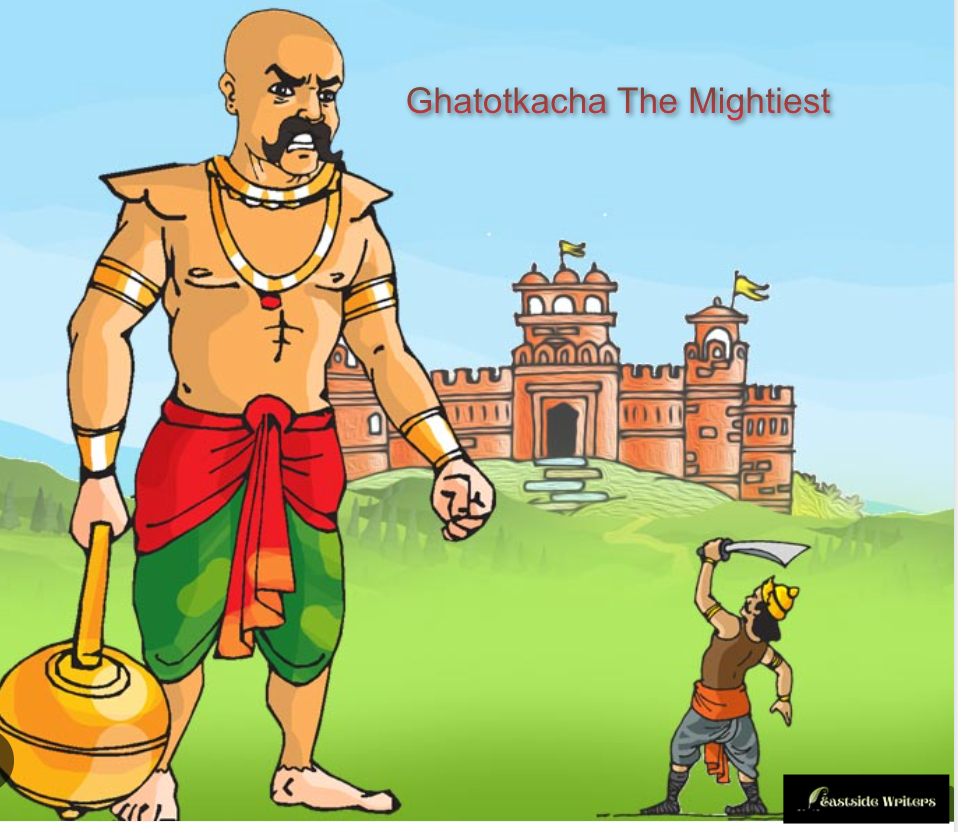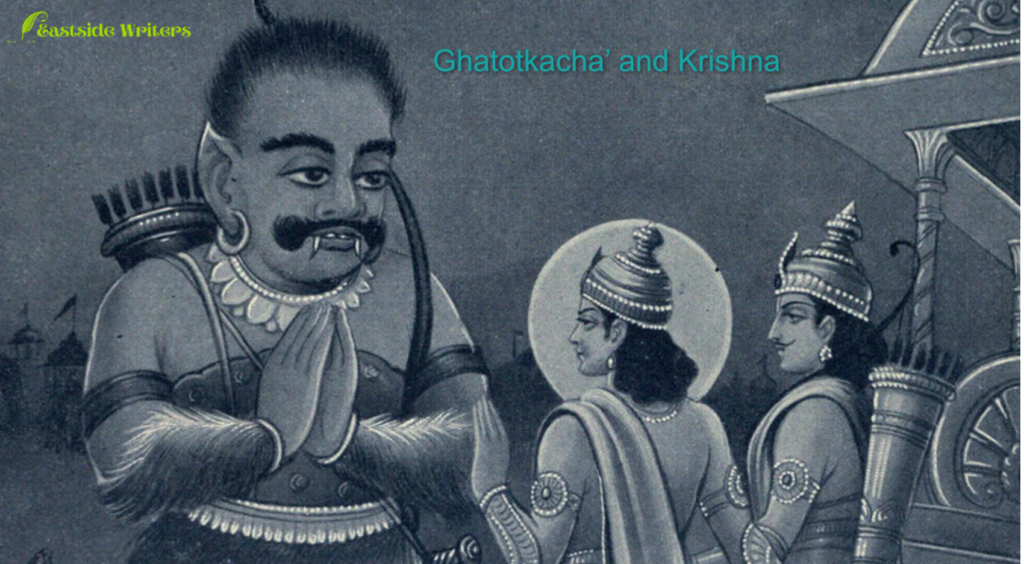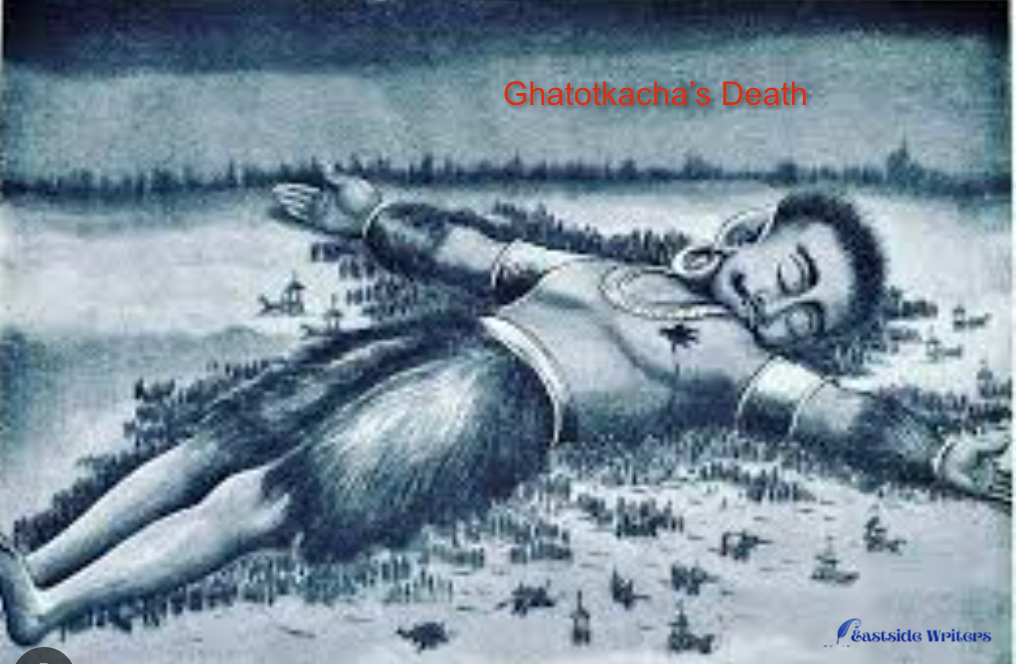In the epic tapestry of the Mahabharata, few moments provoke as much curiosity and debate as Krishna’s laugh at the death of Ghatotkacha. This seemingly surprising reaction from Krishna is not a simple gesture; it carries deep philosophical, moral, and strategic undertones that invite readers to look beyond the surface. Ghatotkacha’s sacrifice was a critical turn in the Kurukshetra war, saving the life of Arjuna and depleting Karna’s divine weapon. Yet, Krishna’s laughter, while often interpreted as divine foresight or a reflection of dharma, continues to stir questions about the nature of duty, sacrifice, and the morality within warfare.

Interpreting this scene means diving into the layered symbolism of mythology and morality, exploring the principles Krishna represents. Across cultures, such as in the Indonesian Mahabharata through Wayang shadow puppetry, Ghatotkacha’s story resonates as an emblem of heroism and honor, further enriching the multi-dimensional meanings behind Krishna’s laughter. This moment compels us to ask: Is Krishna’s reaction an expression of wisdom, detachment, or something more cryptic? Through this article, we will journey through various interpretations of Krishna’s actions, drawing from ancient wisdom, moral philosophy, and cultural variations, to explore what makes this moment in the Mahabharata both timeless and intriguing.
The Context of Ghatotkacha’s Death in the Mahabharata
To understand Krishna’s reaction, we first need to look at the context of Ghatotkacha’s death. Ghatotkacha, the son of Bhima and the demoness Hidimba was not only immensely powerful but also capable of supernatural feats. During the Kurukshetra War, he fought on the side of the Pandavas, wielding magical powers that made him nearly invincible at night.
When Karna, a formidable warrior on the side of the Kauravas, began overpowering the Pandavas, Krishna saw an opportunity. Karna possessed a deadly weapon, the Vasavi Shakti, which could kill any target but could only be used once. Knowing Karna intended to use it against Arjuna, Krishna orchestrated Ghatotkacha’s involvement, making his death strategically advantageous.
Revisiting Krishna’s Actions: Was His Decision Egoistic, Deceitful, or Opportunistic?
Krishna’s orchestration of Ghatotkacha’s death can appear to some as a self-serving act of opportunism, raising questions about the morality of his decision. Could Krishna’s choice, which led to the sacrifice of an ally, be considered egoistic, deceitful, or even a display of low morals in today’s world? Let’s dive into these viewpoints to explore whether modern readers might interpret Krishna’s act as morally ambiguous, or even condemn it as a selfish and cowardly move.
Was Krishna’s Action Egoistic?
At first glance, Krishna’s manipulation of events to protect Arjuna might seem egoistic. Arjuna held a unique position in Krishna’s life and purpose—he was the instrument through which Krishna intended to fulfill dharma. By ensuring Arjuna’s survival, Krishna was effectively prioritizing one warrior’s life over another’s, raising questions about favoritism. From a modern standpoint, where fairness and equality are highly valued, Krishna’s decision to sacrifice Ghatotkacha for the benefit of his close ally Arjuna could be seen as a biased and self-serving action.
Krishna’s egoistic angle is further highlighted by his role as a divine being who commands immense power and influence. As someone who wielded such control, he could have intervened differently to alter the course of events. But he chose to manipulate Ghatotkacha’s fate without seeking any consent or consideration, which might seem morally questionable. In today’s context, Krishna’s actions challenge us to ask: Is it ever right to prioritize a specific individual based on personal motives or preconceived purposes, even if one believes in a greater goal?
Krishna’s Use of Deception: Was It Justifiable?
Krishna’s actions involved deceptive tactics—he effectively used Ghatotkacha as a tool, leading him into a battle where he was destined to die, solely to drain Karna’s weapon. To a modern reader, Krishna’s manipulation might seem cold and even cunning. Unlike other characters in the Mahabharata, who openly engaged in physical and strategic combat, Krishna’s manipulation occurred behind the scenes, making him an indirect orchestrator of events, rather than a direct combatant.
This raises an interesting question: is such indirect manipulation morally justified in any situation? In today’s society, leaders and influencers who use covert strategies are often held in contempt, viewed as lacking transparency and honesty. Krishna’s approach may be compared to political and corporate leaders who manipulate situations for personal or organizational gain. This kind of manipulation could be criticized as deceitful, especially when those involved, like Ghatotkacha, remain unaware of the full scope of their role in the larger plan.
The Mahabharata’s ethical dilemmas are complex, but Krishna’s use of deception certainly invites readers to scrutinize his approach. Was it fair to lead Ghatotkacha to his death for a greater cause without transparency? While some may argue that the end justifies the means, others could condemn Krishna’s behavior as lacking the honesty expected from a divine guide.
Low Morals or Strategic Brilliance?
For many of us, Krishna’s use of Ghatotkacha as a sacrificial pawn might seem like an act of low moral integrity. By sending him to his death, Krishna effectively chose a life to discard in order to achieve his own objectives. In contemporary terms, this could be seen as using people as disposable resources, a practice often condemned in the modern discourse on ethics and humanity.
In corporate or political settings, treating individuals as “means to an end” without regard for their personal sacrifice is often criticized as unethical. Viewed through this lens, Krishna’s treatment of Ghatotkacha might be condemned as opportunistic and morally questionable. In situations where individuals are sacrificed for the larger mission, the question of ethics inevitably arises. Krishna’s strategy may be brilliant, but it presents a moral ambiguity that would likely be criticized in modern times.
However, Krishna’s actions also force readers to consider the dilemmas of war. In times of crisis, leaders may find themselves faced with impossible choices that demand sacrificing some for the benefit of many. Krishna’s decision reflects the dark realities of warfare and strategy, where maintaining an ideal moral code is challenging. While the act may seem low in moral value, it also demonstrates the brutal necessity of strategic brilliance in warfare.
Was Krishna Acting out of Cowardice or as a Calculated Leader?

Some critics might argue that Krishna’s actions reflect an underlying cowardice, as he avoided directly facing Karna and instead orchestrated events from behind the scenes. Rather than confronting Karna head-on, he used Ghatotkacha as a shield, sacrificing a loyal ally to secure Arjuna’s life. This indirect approach might appear as dodging confrontation, and in today’s world, where direct leadership and accountability are highly valued, Krishna’s reluctance to directly intervene could be interpreted as a form of moral weakness.
However, another perspective suggests that Krishna’s indirect approach could be viewed not as cowardice, but as a form of practical leadership. In a high-stakes situation, Krishna chose a path that balanced strategic advantage with minimal risk, a hallmark of calculated and effective leadership. Modern leaders, particularly in fields like politics or business, often face similar moral challenges: balancing effective outcomes with difficult ethical considerations. Krishna’s actions, though controversial, highlight the complexities of leadership—sometimes achieving the greater good requires adopting unconventional, and often morally ambiguous, strategies.
Opportunism or Foresight: The Double-Edged Nature of Krishna’s Decision
Krishna’s decision to sacrifice Ghatotkacha could be seen as a blatant act of opportunism. By using Ghatotkacha to neutralize Karna’s weapon, Krishna secured a tactical advantage, exploiting the strengths and vulnerabilities of others for his own ends. In modern ethical debates, opportunism is often viewed negatively, associated with selfishness and exploitation. Krishna’s decision might be condemned as a morally dubious act, driven more by self-serving motives than by genuine concern for justice or dharma.
On the other hand, Krishna’s foresight reveals a profound understanding of the war’s stakes, as he knew the cost of Karna’s weapon could devastate the Pandava army. By sacrificing Ghatotkacha, Krishna preserved the chances of victory, protecting countless others in the process. This viewpoint portrays Krishna not as an opportunist, but as a strategist with immense foresight who acted out of necessity. The act is neither purely opportunistic nor entirely altruistic—it exists within the grey area where pragmatism and morality collide.
This duality is crucial for understanding Krishna’s actions, as it forces readers to consider the balance between moral ideals and practical demands. Leaders today might face similar moral conflicts, where the pursuit of a beneficial outcome requires making decisions that could be interpreted as opportunistic. In such cases, Krishna’s actions serve as a reminder that effective foresight often involves navigating complex ethical terrain.
The Philosophical Angle: Krishna as a Detached Observer
From a philosophical interpretation of Krishna’s laugh, Krishna is often seen as a detached observer—one who operates beyond the dualities of joy and sorrow. In the Bhagavad Gita, Krishna speaks to Arjuna about the importance of detachment, encouraging him to act without attachment to the fruits of his actions.
Krishna’s laugh could symbolize this detachment. As an avatar of Vishnu, Krishna embodied a divine perspective, perceiving life, death, and suffering as part of the grand cosmic plan. In this light, Krishna’s laughter reflects a cosmic understanding—he sees Ghatotkacha’s sacrifice not as a loss, but as a necessary step in the larger design of dharma.
The Emotional Angle: Was Krishna’s Laugh Misunderstood?
One might wonder if Krishna’s laughter is, in fact, a misunderstood expression of emotion. Could he have felt both sadness and relief? Although Krishna chose this path for strategic reasons, his emotions in the Mahabharata often reflect deep empathy for those affected by his actions.
In this interpretation, Krishna’s laugh might mask sorrow for the loss of Ghatotkacha, a warrior whose life was cut short for a greater cause. This view emphasizes Krishna as a figure balancing duty with compassion, making his decision not a cold calculation, but a heartfelt sacrifice for the greater good.
The Indonesian Mahabharata: A Different Perspective on Krishna and Ghatotkacha
The Indonesian Mahabharata, especially in the art of wayang kulit (shadow puppetry), offers a unique take on Ghatotkacha and Krishna. In Javanese culture, Ghatotkacha is highly celebrated and often depicted as a heroic figure. The Javanese version emphasizes his noble qualities, showing Ghatotkacha as an individual who willingly sacrifices himself for the Pandavas.
Here, Krishna’s laugh is seen less as a strategic act and more as an acknowledgment of Ghatotkacha’s valor. The emphasis shifts from strategy to honor, highlighting the cultural variations in Mahabharata narratives that add richness to the interpretation.
A Detailed Article on Wayang Kulit and Mahabharata for readers who want to dive deeper into this Indonesian version
Modern Relevance: Lessons from Krishna and Ghatotkacha’s Story
The story of Krishna and Ghatotkacha in the Mahabharata carries timeless lessons that resonate deeply with challenges in today’s world, offering insights on duty, sacrifice, and leadership. Despite being part of an ancient epic, their story sheds light on universal values that remain profoundly relevant, especially in contexts of decision-making, strategic thinking, and personal growth.
- The Value of Sacrifice for the Greater Good
- Ghatotkacha’s ultimate sacrifice for the Pandavas serves as a powerful reminder of the importance of selflessness and the willingness to place collective welfare above individual desires. In our contemporary lives, this lesson is relevant in various domains, from public service to social activism, where people often make personal sacrifices for the benefit of others. Whether it’s healthcare workers prioritizing patient care over their own comfort, or environmental activists striving to protect the planet, Ghatotkacha’s sacrifice encourages us to look beyond ourselves for the sake of the larger good.
- Additionally, the willingness to accept difficult choices, as Ghatotkacha did, demonstrates a level of commitment to duty that is increasingly rare in a world often driven by self-interest. It challenges us to consider: Are we prepared to sacrifice our comfort, time, or resources for the benefit of our communities and future generations?
- Duty and Detachment in Decision-Making
- Krishna’s laugh in this situation illustrates a profound spiritual lesson in detachment. While deeply involved in guiding the Pandavas, Krishna remains detached, fully accepting the costs and outcomes of the decisions he makes. In modern contexts, whether in business, politics, or personal life, there is a valuable lesson here about making tough decisions without personal attachment to the results. Detachment allows us to act with clarity and purpose, reducing the risk of clouded judgment due to emotional investment.
- For leaders, this lesson is especially important. Often, leaders must make decisions that affect others, sometimes adversely, for the sake of a larger purpose or long-term benefit. Krishna’s detachment teaches leaders to make these choices with wisdom, empathy, and a clear mind, unencumbered by ego or emotional bias.
- Strategic Thinking and Long-Term Vision
- Krishna’s foresight and strategic use of Ghatotkacha to counter Karna’s deadly weapon highlights the power of strategic thinking and long-term vision. Rather than reacting impulsively, Krishna carefully orchestrates events to protect Arjuna and ultimately secure victory for the Pandavas. In today’s competitive world, the ability to think strategically, foresee challenges, and plan accordingly is crucial, whether in business, government, or personal goals.
- This story also shows us that sometimes, achieving the greater goal requires difficult, sometimes seemingly ruthless choices. Krishna’s example demonstrates how important it is to stay focused on long-term outcomes and be willing to make sacrifices along the way. For those in leadership roles, this is a reminder that clear, goal-oriented decisions often require a level of boldness and resilience, even in the face of potentially harsh judgments from others.
- The Balance Between Personal Values and Organizational Goals
- Ghatotkacha’s willingness to give up his life to protect the Pandavas represents a balance between personal loyalty and organizational objectives. In modern organizations, employees often face conflicts between personal values and the goals of the organization they serve. Ghatotkacha’s story suggests that one’s commitment to a greater purpose can help navigate these challenges, providing a deeper sense of meaning to the sacrifices we make.
- This lesson is particularly relevant in team dynamics and corporate culture. It emphasizes that individuals who share a common purpose or mission can achieve incredible things by supporting each other, even when it requires personal compromise. The story invites today’s leaders and team members to reflect on how they can foster a work environment that balances personal aspirations with collective goals.
- Resilience in the Face of Adversity
- The story of Ghatotkacha is also a testament to resilience. Knowing his likely fate, he still faced battle head-on, demonstrating courage and strength. In modern life, where people often confront uncertain and challenging situations—whether in careers, relationships, or health—Ghatotkacha’s courage in adversity serves as a source of inspiration. His actions remind us to remain committed to our purpose, even when the path is daunting.
- This kind of resilience is crucial for personal development. Ghatotkacha’s unwavering resolve teaches us that fulfilling our duties, no matter how challenging, builds inner strength and character. It encourages us to embrace our responsibilities with bravery and to see adversity as an opportunity for growth.
- Respect for Diversity of Perspectives
- Different interpretations of the story—whether in the Indian or Indonesian Mahabharata—highlight the importance of cultural diversity in understanding complex narratives. In today’s globalized world, where people from varied backgrounds interact regularly, appreciating diverse viewpoints is essential for harmony and mutual respect. Krishna’s laughter, interpreted differently across cultures, encourages us to approach complex issues with openness and empathy, recognizing that there can be multiple valid perspectives.
- This understanding is particularly important in multicultural societies and workplaces. By learning to see through the lenses of others, as we do with Krishna’s laughter, we can navigate cultural differences, fostering better collaboration and unity.
- Life’s Impermanence and Acceptance
- Krishna’s laughter also underscores the transient nature of life and the acceptance of change. In a world where people often struggle with loss and impermanence, Krishna’s reaction serves as a reminder that life and death are both parts of a larger cycle. His laughter symbolizes the importance of embracing life’s uncertainties and the need to accept things beyond our control.
- This acceptance is crucial for mental and emotional well-being. Krishna’s perspective inspires us to cultivate inner peace by recognizing that every experience, whether joyous or painful, has a place in the cosmic order. This approach encourages mindfulness and the pursuit of spiritual balance, essential for navigating modern life’s challenges.

Conclusion:
The Profound Significance of Krishna’s Laugh at Ghatotkacha’s Death
Krishna’s laughter at Ghatotkacha’s death represents a moment of deep spiritual and cosmic insight that goes beyond simple strategy. On the surface, it may appear as a calculated move to protect Arjuna and secure the Pandavas’ victory in the Kurukshetra War. However, in the broader context of dharma (cosmic order) and karma (cause and effect), Krishna’s reaction carries layers of spiritual significance.
From a spiritual perspective, Krishna’s laugh can be seen as an acknowledgment of life’s impermanence and the inevitable workings of divine will. Ghatotkacha’s sacrifice, though painful, was essential to maintain balance, illustrating the selflessness and detachment required for dharma to prevail. Krishna’s laughter, then, symbolizes acceptance—an understanding that each life has its role in the grand design, and that every soul, upon fulfilling its purpose, moves toward liberation. By laughing, Krishna honors Ghatotkacha’s role in this cosmic cycle, seeing his sacrifice not as an end but as a transcendence to higher realms.
This divine laugh also reflects Krishna’s detachment, a reminder that the ultimate truth lies beyond human emotions like sorrow and joy. Krishna embodies the cosmic law that governs the universe impartially, acting with wisdom, foresight, and love, but without attachment to any single outcome. In this light, his laughter reminds us that true spirituality requires a perspective that embraces both life and death as parts of a larger, divine play.
In the end, Krishna’s laugh signifies a cosmic alignment, an acknowledgment of the deeper spiritual principles at work. It teaches us to see beyond immediate loss and recognize the eternal journey of the soul—a journey guided by karma, fulfilled by dharma, and elevated through divine wisdom.
Disclaimer:
The author’s views are his or her own. The facts and opinions in the article have been taken from various articles and commentaries available in the online media. Eastside Writers nor the writer takes any responsibility or obligation for them.
Note: Contact our Writers at www.eastsidewriters.com for writing Blogs/Articles on any niche. We have experts in various domains from Technology to Finance. Spirituality to Lifestyle and Entertainment.






